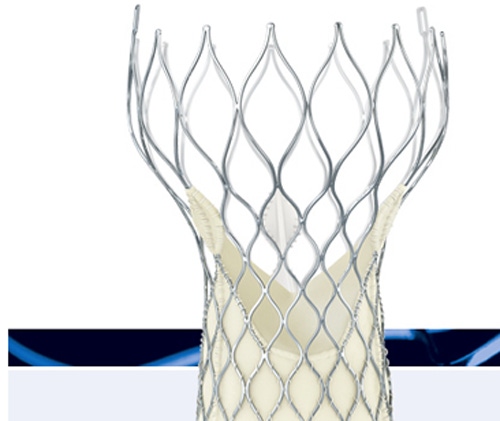TAVR is Good Option For Lower Risk Patients Too
Clinical evidence supporting use of a less invasive approach to replacing diseased heart valves is building among patients that are considered to be at low or moderate risk for open heart surgery.
June 1, 2015

Arundhati Parmar
The CoreValve TAVR System from Medtronic |
The clinical evidence supporting the use of transcatheter aortic valve replacemen therapies has been growing annually for patients with diseased heart valves who are too sick to undergo surgical valve replacement.
But now data from a new clinical trial shows that it is as good an option as surgical valve replacements for patients who are at a low or intermediate risk for the surgical procedure.
Data presented at the recently-concluden EuroPCR conference in Paris shows that the first randomized clinical trial to pit TAVR against the surgical procedure in lower-risk patients found that the rates of stroke were lower in the minimally invasive approach when compared with open heart surgery and surgical valve replacement.
Two years after the procedure, rate of stroke was 3.6% among patients treated with TAVR compared with 5.4% treated surgically. Death from any cause, stroke or myocardial infarction was low in both groups with TAVR edging out slightly (15.8%) compared with 18.8% among those treated using surgery.
The study called NOTION was funded by the Danish Heart Foundation, used Medtronic's CoreValve transcatheter system and enrolled patients between 2009 and 2013.
"With low rates of mortality and stroke, the two year outcomes from NOTION show promise that the CoreValve System may be a viable treatment option for a broader patient population," according to a Medtronic spokeswoman.
However, trial investigators concluded that longer term data on durability is necessary as well as more randomized clinical trials in lower risk patients to truly judge the benefit of TAVR compared with SAVR.
In the United States, Medtronic and Edwards Lifesciences are the only two companies with commercially available TAVR devices. Europe has a slightly crowded arena with Boston Scientific's Lotus TAVR, St. Jude Medical's Portico and TAVR systems made by JenaValve Technology. A startup - Direct Flow Medical - which has developed a metal-free TAVR device also has CE Mark.
Arundhati Parmar is senior editor at MD+DI. Reach her at [email protected] and on Twitter @aparmarbb
[Photo courtesy of Medtronic]
Stay abreast of industry trends at MD&M East Conference in New York, June 9-11 at the Jacob J. Javitz Convention Center |
CORRECTION - An earlier version of the story mischaracterized the adverse event of stroke in TAVR and SAVR.
You May Also Like


